10th IBCA PanAmerican Games for Blind set new records
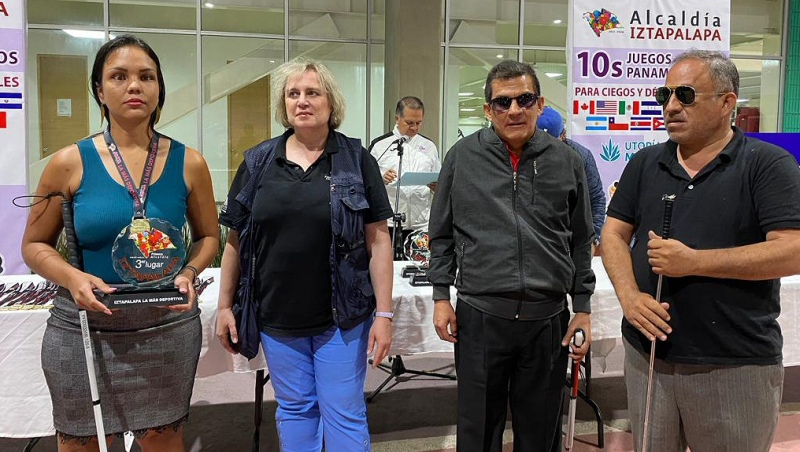
The 10th IBCA PanAmerican Games for the Blind and Visually Impaired took place in Mexico City, Mexico, from October 23-29, 2022. Organized by the IBCA and the Mexican National Network for the Blind with chief organizer Mr Benito Enrique Hernández López, the competition brought together 54 participants representing 13 federations from North, South, and Central America. The players used specialized Braille chess boards, talking clocks, and voice recording equipment. Located at Utopia Meyehualco, part of the Centro de recreación en la Ciudad de México, the playing venue allowed the participants to enjoy excellent playing conditions in outdoor patios protected from sun and wind. On a rest day, the organizers kindly offered free excursions to the Museo Nacional de Arte, the Mexican national art museum that features a unique collection of Mexican art from the mid-sixteenth century, and to the Basílica de Santa María de Guadalupe, an outstanding social and cultural phenomenon that receives more than 20 million pilgrims every year, making it the most visited Marian precinct in the world, surpassed among the Catholic shrines only by Saint Peter’s Basilica. Titles and medals were contested in four categories. The Totally Blind / Women section witnessed the triumph of Columbian ladies: Gold Medal Yolima Franco Perez (COL) Silver Medal Maribel Yepes Bermudez (COL) Bronze Medal Leidy Tatiana Contreras Sandoval (COL) Similar domination was demonstrated by Columbian players in the Totally Blind / Open section: Gold Medal Fredy Alexander Jaimes (COL) Silver Medal Saulo de Jesus Torres (COL) Bronze Medal Fernando Daza Samboni (COL) In the Visually Impaired / Women section, the trophies went to representatives of three different countries: Gold Medal Leidy Johanna Bautista Chiquillo (COL) Silver Medal Jessica T. Lauser (USA) Bronze Medal Eunize Nikol Espinosa Toala (ECU) Finally, in the Visually Impaired / Open section, two players from Venezuela made the podium: Gold Medal Harlen Jose Otero Munelo (VEN) Silver Medal Henry Monterrey (VEN) Bronze Medal John Mike Rosales (COL) The closing ceremony on October 29th featured Ms Clara Brugada Molina, Mayor of Iztapalapa, Ciudad de Mexico; Ms Diana Tsypina (Canada), IBCA 2nd Vice-President; Mr Fernando Daza Samboni (Columbia), IBCA Continental Representative for the Americas; Ms. Yolanda Nuñez, Secretary General of the Mexican National Network for the Blind (RENAC México); Mr Javier Pelalta, Head Principal of Sports; Ms Diana Elizabeth Taylor Sanchez, Head of Linguistic Services; Ms Lidia Rodriguez, Secretary of Inclusion and Wellness; authorized representatives of municipal agencies in charge of tourism and the affairs of the disabled. The ceremony started with a live rendition of the Mexican anthem and continued with traditional songs and dances performed by Iztapalapa artists. Then, Mayor Clara Brugada Molina thanked all participants and officials for coming to Mexico City and reminded them of the rich history of the place that was founded by the Aztecs as Tenochtitlan. For seven days, the most populous city in North America opened its heart to disabled players. She highlighted the excellent collaboration between the IBCA, the organizers, and local authorities that made it possible for the participants to meet in Iztapalapa in person and enjoy chess. The IBCA 2nd Vice-President Ms Diana Tsypina thanked the authorities of Mexico City and Iztapalapa, the local organizers, and the IBCA América Board members for all the hard work they put into this important competition. Fair play and good sportsmanship were shown by everyone. The event set new participation records both in the number of players and the number of federations represented. Ms. Tsypina reminded the audience that such a well-attended PanAmerican competition was yet another milestone in executing the IBCA strategic development plan for 2021-25. The IBCA and its national members – the organizations specifically established for the promotion of Braille chess for the blind and visually impaired – productively work in with respective countries’ governments, NGOs, national Paralympic Committees, the International Blind Sports Federation, FIDE, and other international associations as partners respecting each other’s core areas of expertise and advancing the goals set in the United Nations Convention on the Rights of Persons with Disabilities, the EU Charter of Fundamental Rights, and similar documents. Chief Arbiter Gustavo Vargas Cortez announced the official results. The dignitaries presented the players with medals and trophies. The winners were met with huge applause. The national anthems of Columbia and Venezuela were played. The next IBCA PanAmerican Games will be held in Guatemala. The International Braille Chess Association (IBCA) is the supreme body responsible for chess for the blind and visually impaired. The IBCA is part of the International Blind Sports Federation and an Affiliated Member of FIDE. Founded in 1958, the IBCA has grown to more than sixty countries on four continents. Its major competitions include the Blind Chess Olympiad and the Blind World Chess Championships. Information and photos are provided by the IBCA América, the Mexican National Network for the Blind, and Alcaldía Iztapalapa.
FIDE World FR Championship: Carlsen crashes out, Nakamura downs prodigy to set up surprise final
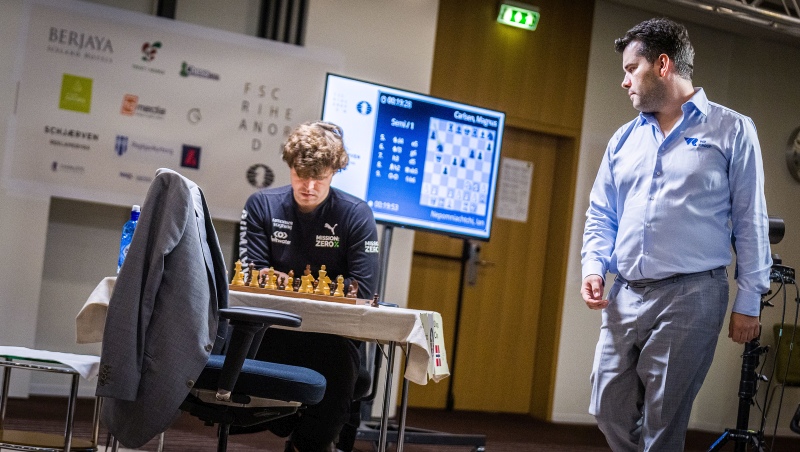
Ian Nepomniachtchi gained Fischer Random revenge for his unsuccessful classical title challenge against Magnus Carlsen last year, and immovable object Hikaru Nakamura toppled the irresistible force of the preliminaries, Nodirbek Abdusattorov, to set up a title match few predicted. Nakamura, the only undefeated player in the event, eliminated Abdusattorov with a shocking 3-0 sweep, while Nepomniachtchi won three in a row after dropping the first game in a very nervy clash with Carlsen. The day’s play The knockout segment in the FIDE World Fischer Random Chess Championship produced the title finalists from two intriguing semifinal match-ups. Reigning classical chess world Magnus Carlsen faced his previous challenger for that title, Ian Nepomniachtchi, in one of the best-of-four, two mini-match duels. Reigning World Rapid Chess Champion, the Uzbekistan teenage prodigy Nodirbek Abdusattorov, who had shown awesome form in the preliminary group stage, met the well-known master of both this variant, but also all forms of speedier chess – US Grandmaster Hikaru Nakamura. Carlsen was the last to arrive as the players gathered for the unveiling of the first position of the day, as well as another drawing of lots. Chief Arbiter Omar Salama concealed a different colored pawn in each fist and asked first Carlsen, and then Nakamura, to choose a hand. Carlsen picked one with black, meaning he will play this color in games 1 and 4, while Nakamura did the opposite. This ritual guarantees that the players will get both sequences of color in the mini-matches. Start position 1 Salama said that he reckoned that getting to play white in the final game could be a small advantage in a must-win situation – though it must be stressed that given the embryonic state of opening knowledge in Fischer Random, the statistical advantage of who moves first is harder to measure. Today’s ceremonial first moves were played by a pair of six-year-olds, Aria Björk and Thor Gudni, representing their preschool Laufasborg. Salama has been teaching chess there for 15 years and explained Laufasborg’s unusually rich chess tradition, which has been covered in several international TV news documentaries. “The chess room there is named after (Iceland’s first Grandmaster) Fridrik Olafsson, who visits it often on his birthday, 26th of January – which is the chess day of Iceland.” All kinds of excitement The two games quickly burst into action, with everyone ready to take risks and with complicated and fluctuating battles on both boards. Nepomniachtchi appeared to be on the brink of defeat after giving Carlsen a chance to attack, but his much quicker rate of play soon began to elicit errors from the Norwegian. Carlsen appeared to miss a clear win when down to his last seconds to complete the first 30 moves. This meant the battle flared up again, but now with Nepomniachtchi also beginning to run short of time. A thrilling slugfest lasted until the final seconds, with Carlsen extracting the full point in dramatic fashion, which was greeted by spontaneous applause from the audience. “It was exciting for me too, I understood early that I was going to be under time pressure… In the end, it was a bit messy, a bit random,” Carlsen said. Veteran versus teen The other match had no lack of drama, with Abdusattorov playing with the mix of aggression and optimism that has fueled great results in Reykjavik so far. He seemed to have gained the upper hand quickly, but Nakamura is a master of clever and complex defending. He conjured up a tricky concept and turned the tables when this wily idea punished an overoptimistic decision from his opponent. “Probably I was losing at one moment, but when he allowed this (material) imbalance it was just too easy for me to play,” Nakamura explained. Nakamura turned a material imbalance into a material superiority and won smoothly. Things change quickly in a knockout event. Abdusattorov had dominated his preliminary group and impressed with his smooth attacking play, but now he had to show that can fight back against one of the craftiest of Fischer Random players. Return games Einar S. Einarsson, former President of the Icelandic Chess federation and honorary member of FIDE, made the first move in the second game of the day. The Carlsen-Nepomniachtchi game followed a similar script, the latter playing provocatively and very quickly, while Carlsen again risked serious time shortage while trying to work out the complicated critical variations. Carlsen has been plagued by an unusually high number of serious oversights in the event, and here he stumbled again while trying to refute his opponent’s quick and risky approach. Despite the blunder, Nepomniachtchi was forced to work surprisingly hard to overcome Carlsen’s grim resistance, and he looked both relieved and annoyed when he finally evened up the match. Experience still counts for something in a youthful world, and Nakamura produced an extremely smooth performance to take a surprising 2-0 lead over the man no one wanted to play. Wesley So had some success vs. Abdusattorov in the preliminaries by trying to avoid the sharp, complex positions where the youngster had been so deadly, and Nakamura took a leaf out of this book, exchanging queens early and methodically outplaying his rival in the much more sedate type of position that arose. A newish start The second half of the matches would be played from a new position. Now the tension was more evident, with the players eager to hurry off and try to plot some opening strategy. Abdusattorov was unable to concentrate enough to give a reaction to Norwegian TV, finally just shrugging apologetically and saying he had nothing to add. Starting position 2 The tension may also have been related to what they got – players have muttered darkly whenever they see knights in the corner. This time Carlsen and Abdusattorov would begin their mini-matches with the white pieces. In the initial phase of play both of them appeared to emerge with small advantages, though Abdusattorov’s vs. Nakamura was far more chaotic. Carlsen decided to go pawn
Lei Tingjie advances, Humpy Koneru and Anna Muzychuk to play tiebreaker
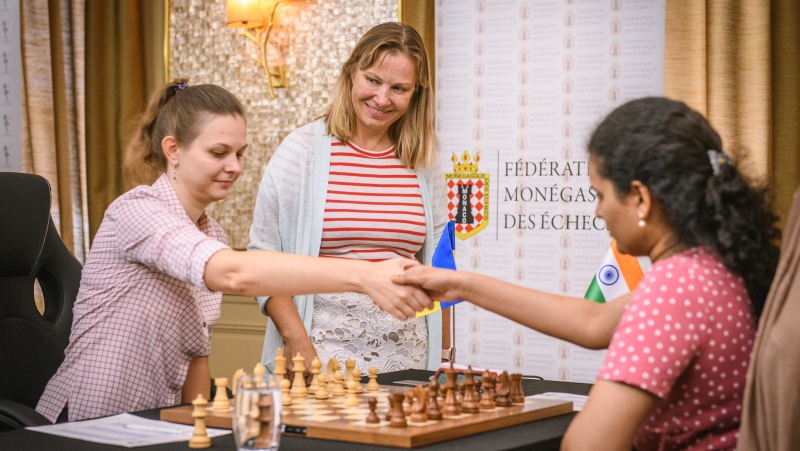
The 4th and final game of the quarterfinals was launched by Svetlana Berezovska, national coach и former national championand and Jean Michel Rapaire, president of the Monaco chess club. Both Muzychuk sisters were in a must-win situation with the white pieces against Lei Tingjie and Humpy Koneru. The first game to finish was the Lei Tingjie – Mariya Muzychuk. After successfully defending in the second round of their match, Lei played the rock-solid Petrov Defence once again. Mariya deviated from the first game as early as move 9, playing 9.Re1 instead of 9.Nc3. Even though Tingjie had a 28-minute think before move 14, the position always remained roughly equal, and the somehow misplaced Na6 got back into the game on move 20. A logical draw was signed on the move 43 and Lei Tingjie punched her ticket to the semi-finals. As for the other match of the day, Anna Muzychuk delivered an amazing game and went on to win on demand to even the score. The opponents repeated the second game of their match, but Humpy swerved off first on the move 12 by playing 12…Nc6 instead of 12…Bf8. With a little more space and more coordinated pieces, it seems like the position was easier to play for Anna, who engineered some activity on the kingside by planting her knight on f5 and advancing h-pawn. Koneru tried to create some counterplay in the center, but it was not nearly as effective. According to the engines, Humpy’s decisive mistake was 22…c4? because she had to spend a lot of time getting it back. Anna, meanwhile, regrouped and pounced on Black’s king by sacrificing an exchange on move 35. After 35.Rexd4 Bxd4 36.Rxd4 Qa2? (better was 36…Qc6 although after 37.Rd6 Qc4 38.Qxe6+ White has a clear advantage in the endgame) 37.Rd7 White launched a deadly attack on Black’s king. A real drama unfolded on the critical control move 40. First Muzychuk erroneously played 40.Kh3? instead of a more natural 40.f4, but with just a few seconds on the clock, Humpy missed a hidden opportunity to draw the game by 40…Rxf2, forcing an exchange of the queens. Instead, the Indian GM grabbed another pawn 40…Qxf6? but after 41.Rg7+ Kh8 42.Ra7 it was all over for Black. Anna won the game convincingly on the move 58. Therefore, Lei will have the right to rest for two consecutive days while the winner of the Muzychuk – Humpy match will be decided tomorrow, 30th of October. The tie-breaks with the rapid 15+10 time control and then blitz if needed promise to be exciting! Official webstie: womenscandidates.fide.com Text: WGM Andreea Navrotescu Photo: Michał Walusza ORGANIZERS: PARTNERS:
Women’s Candidates Pool A: The tension is rising
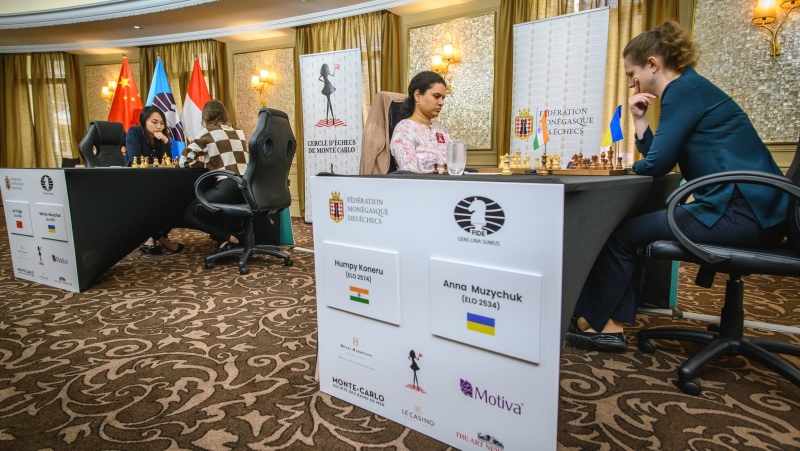
After the first rest day, on the 28th of October, the third games of the 2022 Women’s Candidates Pool A semifinals were played. Both encounters of the day saw some pressure from the black side: indeed, Anna and Mariya had the initiative against Humpy Koneru and Lei Tingjie, respectively. Although both games ended in a draw, an accurate defence was needed for that to happen. It particularly applies to the encounter between Lei Tingjie and Mariya Muzychuk, in which Black was very close to winning. The first game to conclude was the Humpy – Muzychuk one. After some theoretical line of the Semi-Tarrasch that both players seemed to know well, Black introduced a novelty on the move 11 (the first line of Stockfish) and emerged a pawn up in the endgame but with the King stuck in the center. The game was roughly equal all along, and it even seemed like Black could have tested White’s defensive skills a little bit had Anna played 26…Be7! exerting some pressure, instead of 26…g5. All in all, the opponents played a clean, high-quality game that logically ended in a draw. As for the second game between Lei and Muzychuk, it seems like Black missed a clear win. After the queens were exchanged early on in a rare line of Slav Defense, Mariya gradually outplayed her opponent in the ending. She took control of the g-open file, the only available one in the position, and infiltrated with her took into White’s camp. Unfortunately, when Mariya was on the verge of finishing things off, she got off track: Mariya missed 43…Nb4! preserving her knight from the exchange with excellent winning chances. Instead, she played 43…Ke7 and after 44.Bxc6! Lei held a draw with relative ease despite being down a pawn. Tomorrow, the 29th of October the last round of the quarterfinals will be played. Both Muzychuk sisters will have White pieces in a must-win situation. Stay tuned to see if they will manage to even the score and force their opponents to what would be an exciting tie-break! Official webstie: womenscandidates.fide.com Text: WGM Andreea Navrotescu Photo: Michał Walusza ORGANIZERS: PARTNERS:
2022 3rd FIDE Council meeting: List of decisions
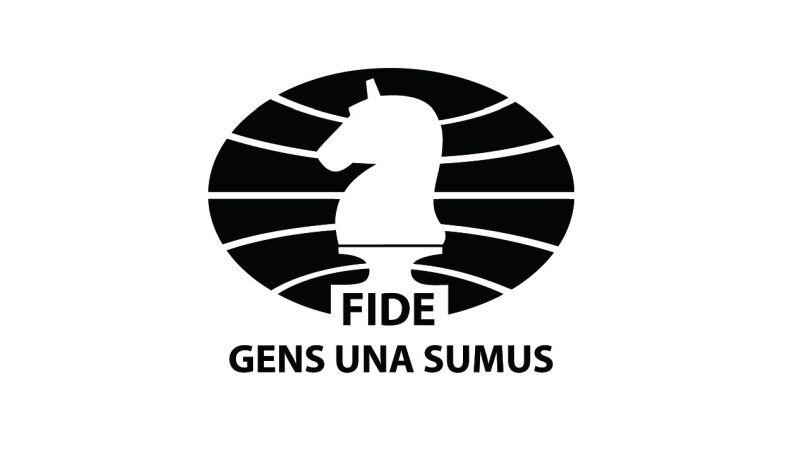
2022 3rd FIDE Council meeting 17 October 2022 List of decisions CM3-2022/01 To note President’s report. CM3-2022/02 To note Treasurer’s report. CM3-2022/03 To note that the suggestions regarding the restructuring of the Federations’ arrears should be sent to the Treasurer and Financial Director. CM3-2022/04 To open bidding procedure for four remaining tournaments under EVE aegis for 2023. CM3-2022/05 To note the Global Strategy Commission’s report. CM3-2022/06 To note the Arbiters’ Commission’s report. CM3-2022/07 To approve the recommendations of the Arbiters’ Commission on Seminars, Classification upgrades, Amendments to the FIDE lecturer list, FA norms and titles. CM3-2022/08 To note the Qualification Commission’s report. CM3-2022/09 To approve the change in Article 7.2.2 of the FIDE Rating Regulations regarding a definition of an “active player”. CM3-2022/10 To refer the proposal in respect of the “Terms used in Tables for Direct Titles” to the next FIDE Council meeting. CM3-2022/11 To approve the proposal of the Qualification Commission in respect of the norms validity and form IT 1 (certificate of title result). CM3-2022/12 To approve the recommendations of the Qualification Commission on titles. CM3-2022/13 To approve the proposed Resolution regarding transfer regulations’ review and tasks the Office to publish the information and send it to all Federations. CM3-2022/14 To note the Rules Commission’s report. CM3-2022/15 To approve the recommendations of the Trainers’ Commission on titles and Academies. CM3-2022/16 To note the Technical Commission’s report. CM3-2022/17 To instruct the Technical Commission to discuss the proposals in respect of Recommendations for the Tournament Organisers with the relevant Commissions. CM3-2022/18 To approve the recommendations of the Events Commission on titles. CM3-2022/19 To note the Planning and Development Commission’s report. CM3-2022/20 To note Continental Reports. CM3-2022/21 To note that the Asian Continental Assembly will be held in January 2023. CM3-2022/22 To note President’s information about non-elected Commissions’ composition. CM3-2022/23 To hold the next FIDE Council meeting in Jerusalem, Israel, on November 25th, 2022.
2022 FIDE World Amateur Championship enters final stretch
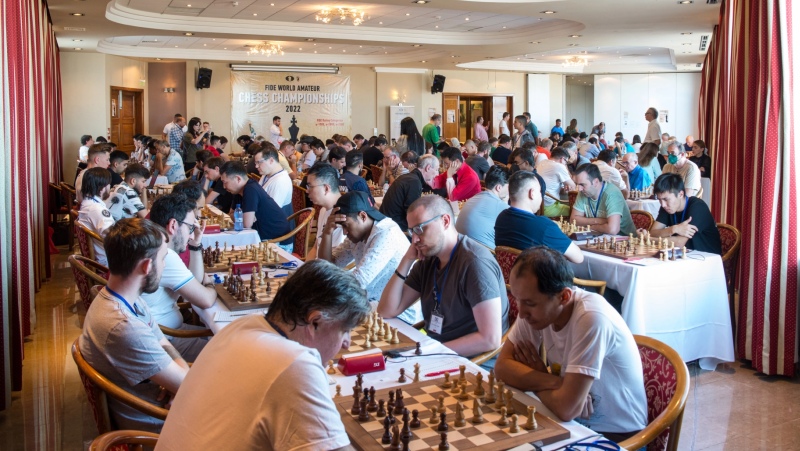
The 2022 FIDE World Amateur Championship is nearing the finish line. Seven out of nine rounds have been played in Malta. With 7 points out of 7, Mongolian players Naranbold Sodbilegt and Margadgua Erdenebayar (pictured below) are the sole leaders in the Open U2000 and Women U1700 categories, respectively. Michal Popiol (Poland), Juan David Becerra (Colombia) and Abilmansur Abdilkhair (Kazakhstan) share the lead in the Open U2300 sitting on 5.5/7. Among the leaders, only Popiol (pictured below), who is 10th on the starting list, has been unbeaten so far. There is a three-way tie for the top position in the U1700 section as well. With two rounds to go, Indian Farhaan M, Otgonbayar Bat-Erdene from Mongolia and Kao Jamison Edrich of Hong Kong are leading the field with 6/7. The 2022 FIDE World Amateur Championships takes place in Malta from October 20-30. The event brought together 197 players from 51 federations, including 27 title-holders. Photo: Andreas Kontokanis
Monaco Chess Club: Rich history and honourable traditions
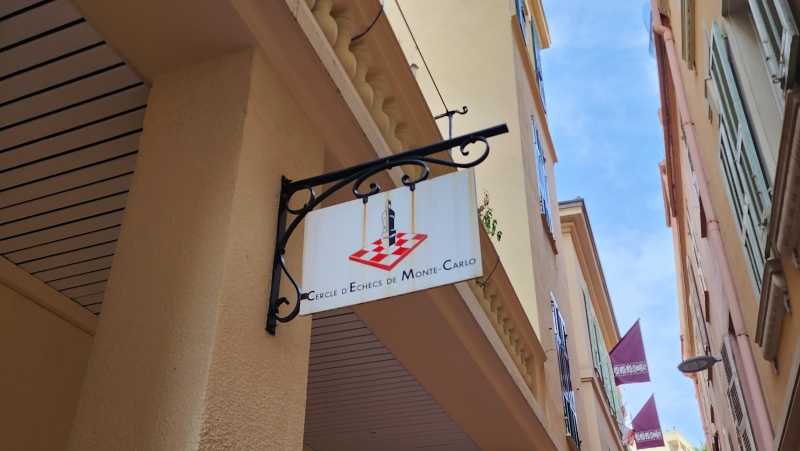
On the rest day at the Candidates Tournament in Monte-Carlo, FIDE Press Officer WGM Andreea Navrotescu visited the local chess club. Here is her story. Today, the 27th of October, was the first rest day at the Women’s Candidates Pool A tournament. The real question is: what should you do as a professional chess player during a rest day? There is probably a no good or bad answer to this question – some players would just relax while others would take advantage of the rest day to prepare even more. What I did today, however, was a visit to the local chess club (an easy choice since I am not playing). I discovered a lot of real gems for a chess fan, and I’m taking you with me! My private guide, Jean-Michel Rapaire, who also happens to be the president of the Monaco chess club, explained that they had been renting their current place since 2008 and that it is a multipurpose space (chess classes are given during the week and on some weekends Monaco hosts French league games). Once we entered the club, I was amazed to see all these relics, including framed pictures, letters from the Monaco Prince himself, magazines, as well as objects of every kind related to chess. The true gem of the collection is Fidel Castro’s chessboard (!!) from the 1966 Olympiad in La Havana. Jean-Michel also spoke about the long-lasting tradition of the Monaco Chess Club participating in the highest-level team competitions. As a fun fact, Jean-Michel said that after the Monaco team won the French League in 2001, he promised the team to double the volume of the champagne bottle… Which seemed to have worked wonders as motivation since they won again in 2002! We can also thank Monaco for establishing the European Small Nations Association (ESNA). Since small such as Andorra, Monaco, Faroe Islands, Luxembourg, Malta, Cyprus, Guernsey, Jersey, Liechtenstein and San Marino have active chess live, they compete in ESNA Individual and Team Championships. This tie is from the 2013 ESNA Team Championship and represents all the nations-members. Monaco has always been extremely supportive of women’s chess, having organized various female Grand-Prix stages (2015 and 2019). It seems to have paid off: Monaco team took eight titles at the European Club Cup and won the French Female League three years ago, in 2019. Players such as Pia Cramling, Humpy Koneru, Muzychuk sisters (does that remind you of some tournament?), Almira Skripchenko are true staples of team Monaco. All we can wish for the players is to give their best in such a place full of history. The third games of the quarterfinals will start on October 28 at 15:00 CET, so stay tuned!
FIDE World FR Chess Championship: Carlsen, Nakamura and Nepomniachtchi reach semifinals
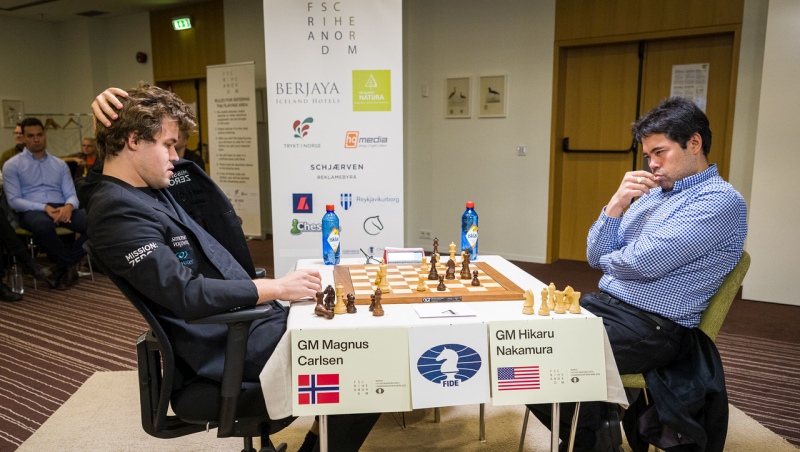
The final day of the group stages of the FIDE World Fischer Random Chess Championship saw three of the heavy favourites advance to the knockout stage, joining Uzbekistan’s teenage sensation Nodirbek Abdusattorov in the semifinal. Classical world champion Magnus Carlsen, his previous challenger Ian Nepomniachtchi, and speed and Fischer Random chess wizard Hikaru Nakamura all booked their spots in the final four, but there was no comeback for titleholder Wesley So, who could not recover from his shaky form earlier in the event. Day of reckoning So started the day on the brink of elimination from the knockout stage, almost certainly needing to win both of his mini-matches to have any hope of advancing and continuing his title defense. The bottom men in each group, Matthias Blübaum and Hjorvar Steinn Gretarsson, had little chance of avoiding a final day play-off match for 7-8 place, but if they finally converted the kind of chances they had generated earlier and scored some points, they could have a decisive say in who gets to play for the title. Tension – and signs of nerves? Round 5 starting position Those with a keen memory for Fischer Random may find the initial position for Round 5 familiar – the players certainly did. It was nearly the same as the one that appeared for Round 3, which Vladimir Fedoseev and Magnus Carlsen rated as one of the worst possible starting positions. The only difference here is in the right-hand corner, where the knight and queen have switched places. Fedoseev seemed almost offended by yet another troublesome setup, saying, “We have the worst possible positions in Fischer-Random for the third straight day. It’s absolutely ridiculous. For me, as a lover of this game, it’s a big upset.” Fascinating to see that some players already have enough immersion in the game to have strong attachments to certain starting formations. Thrills and spills The first game of the round delivered in terms of excitement and drama. In Group A, the unstoppable Abdusattorov won yet again, Ian Nepomniachtchi’s resurgent form derailing after a terrible early oversight that left his position in ruins. With a score of 8.5/9, Abdusattorov remained confident but grounded, saying he had been sloppy the day before but balanced this out with an otherwise good form, so he assessed his performance so far as “normal”. The day’s action had been set in motion by a very special guest, Prime Minister Katrin Jakobsdottir, who made the ceremonial first move in the game Fedoseev – Carlsen. Local hero Gretarsson decided this appearance was his lucky charm and finally transformed a good performance into a full point, defeating an overly determined So. This result means elimination truly looms for the defending champion – unless Gretarsson could also dent Nepomniachtchi in the final match of the day. Gretarsson joked that he would have to ask the PM to attend all of his games. “I think I was a bit lucky, but it was overdue. Hopefully, it is a sign of better things to come,” he said. Hikaru Nakamura continued to set the pace in Group B, beating Blübaum, while Fedoseev and Carlsen traded blows and split the point in a thrilling match where the inventive Fedoseev escaped defeat by spotting a spectacular stalemate combination. The result was a remarkable sixth consecutive draw for Fedoseev, despite a series of complex and ambitious games. Almost anything can happen … but will it? World classical chess champion Magnus Carlsen clarified the situation in Group B by finally managing to defeat Fedoseev, his first loss since their original encounter in the first game of the event. This meant that Carlsen and Hikaru Nakamura would advance to the semifinals, and their looming mini-match would determine the group winner. Carlsen noted that this could be significant, as winning the group would mean avoiding the currently unstoppable Abdusattorov in the semis. The teenager had earlier dismantled Nepomniachtchi yet again for a 4-0 sweep over his esteemed opponent and produced another sparkling example of his direct, attacking style. Nakamura admitted that his lost concentration led to an oversight and nervous moment, but he retained enough defensive resources to weather his error and hold a draw and keep Blübaum from grabbing his first match point. In the last Group A duel, So was putting in the longest office hours again and managed to grind out some revenge and tie his match with Gretarsson. Afterwards, the rueful defending champion gave the Icelander credit for his gritty fighting spirit, and So said that at least his own shaky performance had given local fans something to cheer about. The last remaining drama would be whether upsets can change the race in Group A, where So still had a glimmer of hope of catching Nepomniachtchi, and the clarification at the top of Group B, which would determine who meets the seemingly irresistible force of Abdusattorov. Pairings & results: Round 5 Game 1: Group A Nepomniachtchi – Abdusattorov 0-1 So – Gretarsson 0-1 Group B Fedoseev – Carlsen 0.5-0.5 Nakamura – Blübaum 1-0 Round 5 Game 2: Group A Abdusattorov – Nepomniachtchi 1-0 Gretarsson – So 0-1 Group B Carlsen – Fedoseev 1-0 Blübaum – Nakamura 0.5-0.5 Match scores from Round 5: Group A Abdusattorov – Nepomniachtchi 2-0 So – Gretarsson 1-1 Group B Carlsen – Fedoseev 2-0 Nakamura – Blübaum 2-0 One last start position Round 6 starting position Magnus Carlsen amused himself during the unveiling of the final starting array by guessing which piece would land next on the graphics board, with no luck. The players had a positive reaction to what appeared, with the Americans giving comments. Nakamura said that this looked like a much more enjoyable position, which would be fun to play, while Wesley So smiled and said, “No knights in the corners!” The final round matches largely followed expectations. Blübaum and Gretarsson suffered again, going down to Fedoseev and Nepomniachtchi, respectively. This meant that Nepomniachtchi was through to the semifinals, since even if everything left were to go So’s
FIDE increases prize fund for World Senior Chess Championship
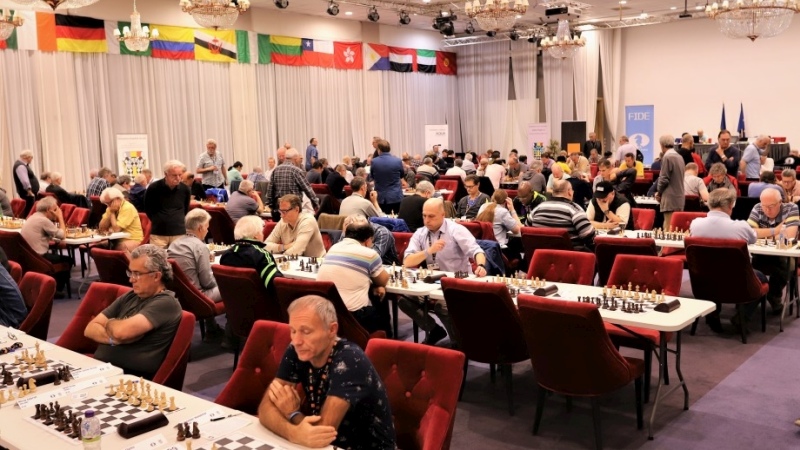
FIDE is pleased to announce an increase in the prize fund for the World Senior Individual Chess Championship 50+ 65+, to be held from November 14-27, 2022, in Assisi, Italy. The FIDE World Senior Chess Championships were cancelled in 2020 and 2021 due to the pandemic, given the vulnerability of this age group to COVID-19, but now it returns to the board under strengthened safety measures. In total, this event will receive €20,000 of extra funding from FIDE, with €17,000 going directly to increase the prize fund and €3,000 to strengthen the existing fair-play measures. Thanks to this addition, the event will reach a record prize fund of € 37,000. Below you can find the detailed distribution and other details about the event. With this move, FIDE keeps expanding its support for senior players, and it complements the annual grants given every year to distinguished players, coaches, arbiters and organizers aged 65+ who are facing an unstable financial situation. “We find it essential to provide the older generation with decent conditions and worthy prizes in FIDE events. Chess contributes to mental longevity, and we are happy to see thousands of senior players proactively competing in various chess competitions on a club and professional level,” says FIDE President Arkady Dvorkovich. The increased funding is just one of the actions planned by FIDE to support chess seniors. Starting next year, FIDE will launch a comprehensive “Active Ageing” project, aiming to engage senior citizens all over the globe. World Senior Individual Chess Championship 50+ 65+ The World Senior Championships is organized by Cristina Rigo and the Arcoworldchess Organization. Located in central Italy, not far from Rome and Florence, Assisi hosts dozens of chess events throughout the year. The program of the event will also include visits to museums, a Blitz Tournament, and FIDE Arbiters Seminar. The championships are 11-round Swiss tournaments with time control of 90 minutes for 40 moves followed by 30 minutes for the rest of the game + 30 seconds per move starting from move 1. List of participants For further information, please visit the official website of the Championship: scaccomattissimo.com/assisi-2022-en Photo: Mark Livshitz
Asian Continental Championship 2022 begins in New Delhi
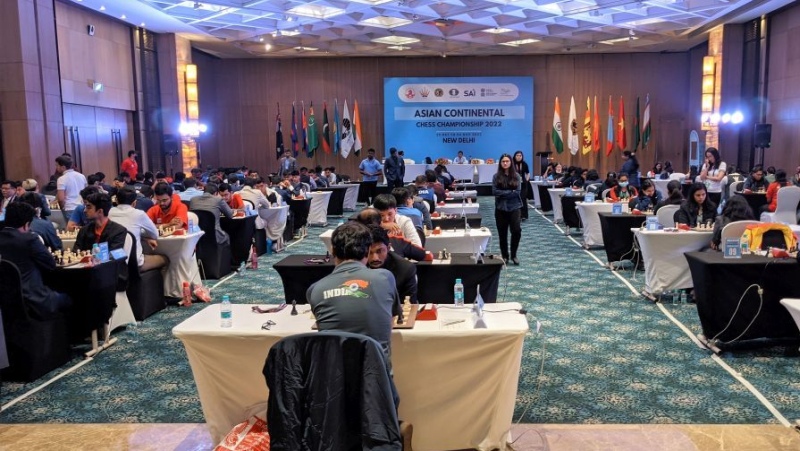
The Asian Continental Chess Championship 2022 got off to a rousing start at Leela Ambience Convention Hotel in New Delhi on Wednesday. 140 players from 13 Asian countries which include 31 Grandmasters, 46 International Masters, 14 Women Grandmasters and 17 Women International Masters are participating in this nine-day-long prestigious competition to decide the Asian champion. With Asian supremacy at stake, the event also serves as qualification for the next year’s World Cup as the top four players in the Open and two players in the women’s category will secure their berth in the World cup. On the opening day, top seeds and favourites Praggnandhaa and Tania Sachdev (pictured above, right) started their championship campaign with draws while ninth seed Abhijeet Gupta and women’s second seed Nomin Erdene Davaademberel of Mongolia lost their games to become the biggest casualties. Turkmenistan’s Saparmyrat Atabayev forced Pragganandhaa to sign the peace treaty after 47 moves while Tania settled for a half point against Sakshi Chitlange after 26 moves after three-fold repetition. Gupta suffered a shock defeat by the hand of Amartuvshin Ganzorig of Mongolia while Liya Kurmangaliyeva got the better of Davaademberel. In other upsets of the day, untitled Sanket Chakravarthy (pictured above, ) outwitted GM Arjun Kalyan while Sharan Rao beat Grandmaster Deep Sengupta. S Nitin and Moksh Amit Doshi held Kazakh Grandmaster Rinat Jumabayev and fifth seed Aryan Chopra respectively in the first round. Photo: Shahid Ahmed & Aditya Sur Roy Regulations for Asian Continental Chess Championship (pdf) Official website: delhichess.com

